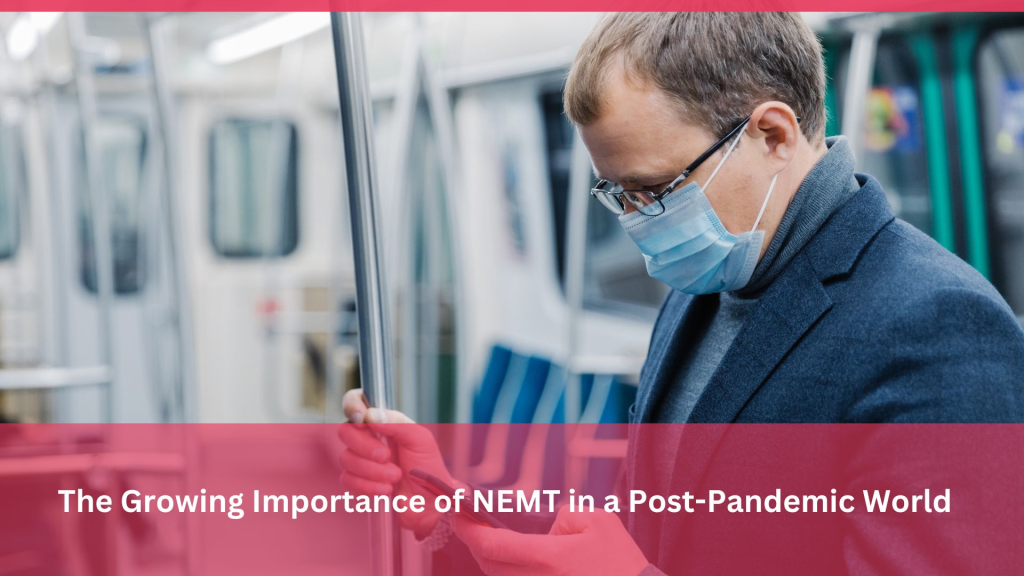New at Safr Care
The Growing Importance of NEMT in a Post-Pandemic World

The Growing Importance of NEMT in a Post-Pandemic World
The COVID-19 pandemic reshaped the way healthcare is delivered and accessed, bringing longstanding gaps in medical transportation into sharper focus. As healthcare systems adapt to new challenges, Non-Emergency Medical Transportation (NEMT) services have emerged as a critical resource. From ensuring continuity of care for vulnerable populations to supporting innovative care models like telehealth and community-based wellness programs, NEMT’s role is expanding. This article explores the growing importance of NEMT in a post-pandemic world, highlighting how it addresses evolving patient needs, fosters health equity, and strengthens healthcare resilience.
Challenges Revealed by the Pandemic
The global health crisis exposed and intensified many barriers to healthcare access. As hospitals and clinics shifted focus to COVID-19 response, patients faced hurdles such as:
- Delayed Care: Routine screenings, preventive appointments, and elective procedures were postponed, creating a backlog of unmet healthcare needs.
- Transportation Insecurity: Reduced public transit services, fear of exposure to the virus, and personal vehicle limitations made getting to medical appointments more difficult.
- Health Disparities: Vulnerable populations, including seniors, low-income individuals, and those living in rural areas, faced even greater challenges accessing care.
In this environment, NEMT services played a crucial role in ensuring patients could access essential treatments, follow-up visits, and preventive measures safely and reliably.
Why NEMT Matters More Now
1. Addressing Delayed and Deferred Care
Many individuals postponed medical appointments during the pandemic, resulting in untreated or progressing health conditions. NEMT services help patients catch up on delayed care by providing safe, trusted transportation solutions that encourage them to resume check-ups, screenings, and follow-ups, ultimately improving health outcomes.
2. Supporting Chronic Disease Management
Chronic diseases such as diabetes, heart disease, and respiratory conditions require consistent monitoring and treatment. For patients who lost regular care routines during the pandemic, NEMT facilitates timely access to specialists, labs, and therapy sessions, reducing complications and hospitalizations.
3. Enabling Telehealth and Hybrid Care Models
As telehealth adoption accelerates, NEMT services complement virtual care by transporting patients to telehealth hubs, community centers with remote consultation facilities, or specialized equipment stations. This approach supports individuals with limited internet access or technology resources, ensuring they can benefit from digital healthcare innovations.
4. Enhancing Health Equity
The pandemic spotlighted health disparities tied to socioeconomic status, location, and cultural factors. NEMT services reduce these disparities by providing reliable transportation options regardless of income or geographic setting. By connecting patients to preventive and primary care, NEMT helps bridge the gap in health equity and fosters community well-being.
5. Building Healthcare System Resilience
A resilient healthcare system can adapt to crises. NEMT services contribute to this resilience by ensuring continuity of care, even during public health emergencies. Their flexibility allows healthcare providers to maintain patient engagement, prevent disease progression, and reduce strain on emergency and inpatient services.
Innovations and Opportunities in Post-Pandemic NEMT
As healthcare evolves, NEMT services are poised to integrate new technologies and care models:
- Data-Driven Route Optimization: Using predictive analytics to anticipate demand, minimize wait times, and improve efficiency.
- Autonomous Vehicles: Exploring self-driving NEMT fleets that operate around the clock, expanding access and reducing driver shortages.
- Community Partnerships: Collaborating with local non-profits, clinics, and social services to create holistic care solutions that combine medical transport, telehealth, and wellness initiatives.
These advancements support a more patient-centered, accessible, and sustainable healthcare ecosystem.
Choosing a Reliable NEMT Provider
As the demand for NEMT grows, selecting a reputable provider ensures patients receive the highest quality service. Companies like SafrCare exemplify this commitment by offering:
- Trained and Compassionate Staff: Ensuring empathy, understanding, and support for each patient’s unique needs.
- Diverse Vehicle Options: Accommodating ambulatory and non-ambulatory patients, including those requiring wheelchairs or medical equipment.
- Flexible Scheduling and Communication: Allowing easy booking, timely updates, and responsive customer support.
A trusted NEMT provider can help rebuild patient confidence in seeking care, even as the healthcare landscape continues to shift.
Looking Ahead
The post-pandemic world offers an opportunity to reimagine healthcare delivery. NEMT services, once considered a supplemental resource, are now central to promoting preventive care, chronic disease management, and equitable access. As healthcare systems invest in infrastructure, technology, and partnerships, NEMT stands as a vital pillar that ensures no patient is left behind due to transportation barriers.
With continued innovation, policy support, and a focus on patient-centered care, NEMT services will help shape a more accessible, resilient, and inclusive healthcare system that thrives in any future crisis—and beyond.
